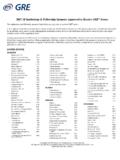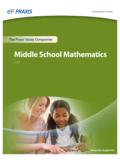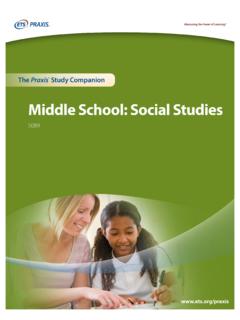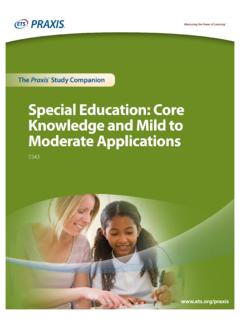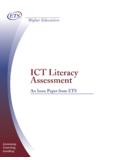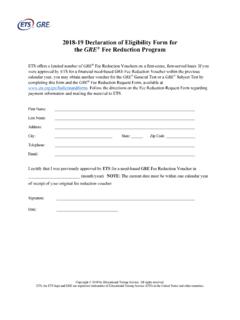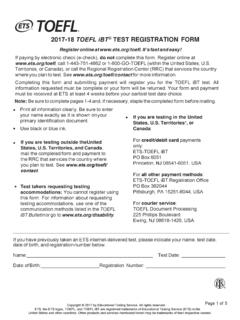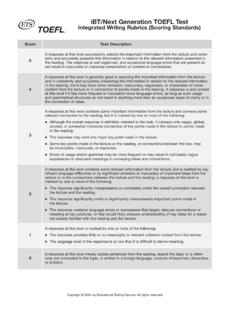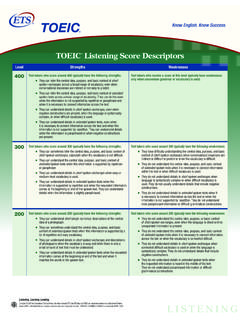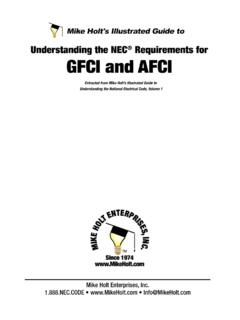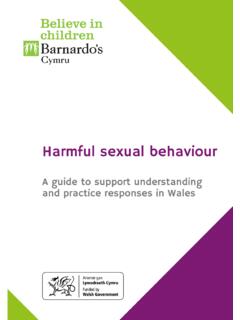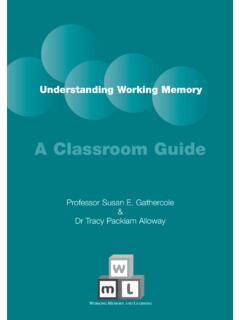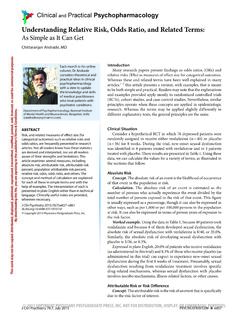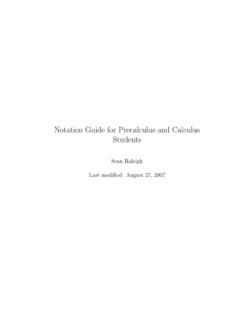Transcription of Performance Descriptors for the TOEFL iBT® Test
1 Performance Descriptors for the TOEFL iBT Test LevelReading SectionAdvanced Score range 24 30 CEFR Level C1 Note: Test takers with scores of 29 or 30 are likely to be able to perform at CEFR Level takers who receive a Reading section score at the Advanced level typically understand academic passages in English at the introductory university level. These passages are dense with propositions and information and can include difficult vocabulary; lengthy, complex sentences and paragraphs; and abstract or nuanced ideas that may be presented in complex takers who score at the Advanced level typically can Understand a range of academic and low-frequency vocabulary as well as less common meanings of words. Understand explicit connections among pieces of information and make appropriate inferences, even when the passage is conceptually dense and the language is complex.
2 Recognize the expository organization of a passage and the purpose that specific information serves within the larger context, even when the purpose of the information is not marked, and the passage is conceptually dense. Follow a paragraph-length argument involving speculation, qualifications, counter-evidence, and subtle rhetorical shifts. Synthesize information in passages that contain complex language and are conceptually range 18 23 CEFR Level B2 Test takers who receive a Reading section score at the High-Intermediate level typically understand the main ideas and important details of academic passages in English at the introductory university level, but they may have an incomplete or incorrect understanding of parts of passages that are especially dense with propositions and information, or complex in their presentation of ideas and takers who score at the High-Intermediate level typically can Understand common academic vocabulary, but sometimes have difficulty with low-frequency words or less common meanings of words.
3 Understand explicit connections among pieces of information and make appropriate inferences, but may have difficulty in parts of a passage that contain low-frequency vocabulary or that are conceptually dense, rhetorically complex, or abstract. Distinguish important ideas from less important ones. Often recognize the expository organization of a passage and the purpose of specific information within a passage, even when such information is not explicitly marked. Synthesize information in a passage, but may have difficulty doing so when the passage is conceptually dense, rhetorically complex, or range 4 17 CEFR Level B1 Test takers who receive a Reading section score at the Low-Intermediate level typically understand some main ideas and important information presented in academic passages in English, but their overall understanding is limited.
4 They are able to understand connections across two or more sentences when the relationships are clear and simple, such as a claim followed by a supporting example. However, they have difficulty following denser or more complex parts of a takers who score at the Low-Intermediate level typically can Understand texts with basic grammar, but have inconsistent understanding of texts with complex grammatical structures. Understand high-frequency academic vocabulary, but often have difficulty with lower-frequency words. Locate information in a passage by matching words or relying on high-frequency vocabulary, but their limited ability to recognize paraphrases results in incomplete understanding of the connections among ideas and information. Identify an author s purpose when that purpose is explicitly stated or easy to infer from the context.
5 Recognize major ideas in a passage when the information is clearly presented, memorable, or illustrated by examples but have difficulty doing so when the passage is more Low- Intermediate Score range 0 3 Test takers with a Reading section score below 4 have not yet demonstrated proficiency at the Low-Intermediate Descriptors for the TOEFL iBT Test LevelListening SectionAdvanced Score range 22 30 CEFR Level C1 Note: Test takers with scores of 28 to 30 are likely to be able to perform at CEFR Level takers who receive a Listening section score at the Advanced level typically understand conversations and lectures that take place in academic settings. The conversations and lectures may include difficult vocabulary, abstract or complex ideas, complex sentence structures, various uses of intonation, and a large amount of information, possibly organized in complex takers who score at the Advanced level typically can Understand main ideas and explicitly stated important details, even if not reinforced.
6 Distinguish important ideas from less important points. Keep track of conceptually complex, sometimes conflicting, information over extended portions of a lecture. Understand how information or examples are being used (for example, to provide evidence for or against a claim, to make comparisons or draw contrasts, or to express an opinion or a value judgment) and how pieces of information are connected (for example, in a cause-effect relationship). Understand different ways that speakers use language for purposes other than to give information (for example, to express an emotion, to emphasize a point, to convey agreement or disagreement, or to communicate an intention). Synthesize information, even when it is not presented in sequence, and make appropriate inferences on the basis of that Score range 17 21 CEFR Level B2 Test takers who receive a Listening section score at the High-Intermediate level typically understand the main ideas and important details of conversations and lectures that take place in academic settings.
7 The conversations and lectures may include difficult vocabulary, abstract or complex ideas, complex sentence structures, various uses of intonation, and information that must be tracked across sequences of , lectures and conversations that are dense with information may present difficulty if the information is not takers who score at the High-Intermediate level typically can Understand main ideas and explicitly stated important details that are reinforced (by repetition, paraphrase, or indirect reference). Distinguish main ideas from other information. Keep track of information over an extended portion of an information-rich lecture or conversation, and recognize multiple, possibly conflicting, points of view. Understand how information or examples are being used (for example, to provide support for a claim), and how pieces of information are connected (for example, in a narrative explanation, a compare-and-contrast relationship, or a cause-effect chain).
8 Understand, though perhaps not consistently, ways that speakers use language for purposes other than to give information (for example, to emphasize a point, express agreement or disagreement, express opinions, or convey intentions indirectly), especially when the purpose is supported by intonation. Synthesize information from adjacent parts of a lecture or conversation, and make appropriate inferences on the basis of that information, but may have difficulty synthesizing information from separate parts of a lecture or range 9 16 CEFR Level B1 Test takers who receive a Listening section score at the Low-Intermediate level typically understand the main idea and some important details of conversations and lectures that take place in academic settings. These conversations and lectures can include basic academic language, abstract or complex ideas that are significantly reinforced, complex sentence structures, certain uses of intonation, and a large amount of information that is repeated or significantly takers at the Low-Intermediate level typically can Understand main ideas, even in complex discussions, when the ideas are repeatedly referred to, extensively elaborated on, or illustrated with multiple examples.
9 Understand explicitly stated important details, but may have difficulty understanding details if they are not reinforced (such as through repetition or with an example) or marked as important, or if they are conveyed over several exchanges among different speakers. Understand some ways that speakers use language to express an opinion or attitude (for example, agreement, disagreement, surprise), especially when the opinion or attitude is related to a central theme, clearly marked as important, or supported by intonation. Understand connections between important ideas, particularly if the ideas are related to a central theme or are repeated, and can make appropriate inferences from information expressed in one or two sentences, especially when that information is Low- Intermediate Score range 0 8 Test takers with a Listening section score below 9 have not yet demonstrated proficiency at the Low-Intermediate SectionAdvanced Score range 25 30 CEFR Level C1 Note.
10 Test takers with scores of 28 to 30 are likely to be able to perform at CEFR Level takers who receive a Speaking section score at the Advanced level are typically able to communicate fluently and effectively on a wide range of topics with little takers who score at the Advanced level typically can Speak clearly and use intonation to support meaning so that speech is generally easy to understand and follow; any minor lapses do not obscure meaning. Speak with relative ease on a range of general and academic topics, demonstrating control of an appropriate range of grammatical structures and vocabulary; any minor errors may be noticeable, but do not obscure meaning. Convey mostly well-supported summaries, explanations, and opinions, including both concrete and abstract information, with generally well-controlled organization and cohesion; lapses may occur, but they rarely impact overall range 20 24 CEFR Level B2 Test takers who receive a Speaking section score at the High-Intermediate level are typically able to communicate effectively on most general or familiar topics, and to make themselves understood when discussing more complex or academic takers who score at the High-Intermediate level typically can Speak clearly and without hesitancy on general or familiar topics, with overall good intelligibility.
